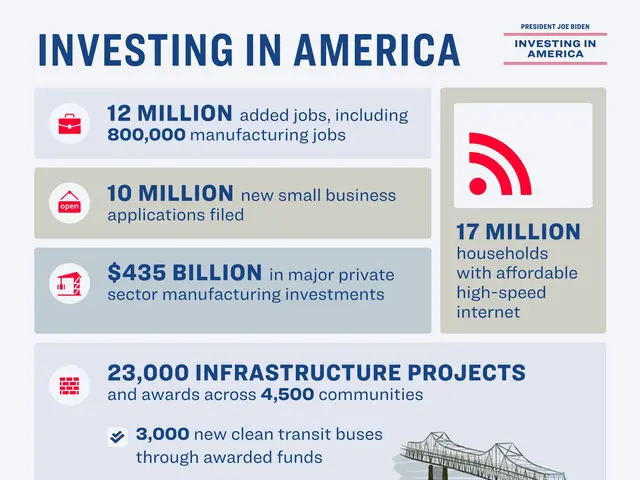Trump's job cuts dismantle the Black middle class that was established through federal work.
A Tale of Black Perseverance and the Fed: Shirley Hopkins and the long-lasting Impact of Federal Employment
Shirley Hopkins, a storied figure, constructed prosperous careers for countless Black workers amidst the federal government's mammoth machinery. Known as the "recruitment lady", Hopkins tirelessly encouraged more Black students in Washington, D.C., to apply for the federal agency's internship and youth employment programs.
Hopkins recalls the pride her mother felt upon securing her first federal job – caring for young cancer patients in National Institutes of Health (NIH) clinical trials as a nurse's aide. This sense of accomplishment underscores the significance of federal employment for Black families, particularly during the post-World War II boom.
The current Trump administration's job cuts, ongoing hiring freeze, and attacks on DEI programs are shaking up what has long been a dependable route into the middle class for countless Black workers, including some Hopkins played a part in recruiting.
To better comprehend this story, it's important to delve into the historical context of the Black middle class and their relationship with the federal government.
From Post World War II to Today's Uncertainty — A Journey of Opportunities and Struggles
A major turning point in the narrative of Black Americans and the federal government dates back to World War II, when countless Black Americans seized job opportunities that previously eluded them under Jim Crow segregation. The federal government, acting as a pioneer, modeling equal environments for all, opened its doors to employ Black Americans, regardless of their skin color.
A prime example of this is Calvin Stevens, who spent more than three decades at the General Services Administration (GSA), starting with inspecting warehouse inventory in Atlanta. Just like Hopkins, Stevens encountered both challenges and triumphs while climbing the ladder to eventually retire as a top-level supervisor (GS-14). Black workers like Stevens found a clear path to professional growth in the federal sector, a path that could prove challenging to find in the private sector.
However, for Black federal employees striving for advancement, progress through the ranks could be a bumpy road, with prejudice and biases to surmount. As Trump administration officials escalate their efforts to dismantle DEI programs, which they have labeled "illegal" and "immoral," fears arise that Black workers will be left vulnerable to the shifting tides of the civil service.
The Eroding Foundation — Impact on Black Families and Communities
Federal job cuts could reshape the lives of Black families, communities, and the American Dream. As recently as not too long ago, the instability that federal jobs now face would have been virtually unfathomable, even for those like Kevin Abernathy, Hopkins's nephew, who followed her advice to apply for his first federal opportunity.
Abernathy's steady career with the U.S. Postal Service, along with the opportunities it afforded his family, would seem untouchable. Today, though, his son has chosen to leave a federal job and venture into the private sector, faced with the uncertain landscape behind Trump's calls to shrink the federal workforce.
The potential shrinking of the federal workforce could lead to fewer opportunities for Black workers to gain essential skills and experience vital to securing private sector roles. This, in turn, could further limit their access to the middle class.
A series of ripple effects could potentially be felt in the D.C. suburbs, places like Prince George's County and Charles County, which have become wealthiest majority-Black counties due to the influence of U.S. government work.
Dismantling the federal government seems to go against the values and objectives it has traditionally upheld: truth, justice, equity, and opportunity. The question remains if this deliberate move neglects the structural forces that have long threatened the fragility of the Black middle class, or if it merely reflects the current administration's design.
Until now, the White House had yet to respond to this concern. In the meantime, for a Black employee facing the prospect of a layoff at the Department of Health and Human Services, it seems that the ground beneath their feet has crumbled – their "American Dream" threatened, not because of any failure, but because of the winds of change blowing through the federal government.
Footnotes:
- Fragmented and stylistically unconventional sentences likely represent the speaker's emotional distress (such as "It feels like my whole world is just knocked off its axis by no fault of mine," or "as a Black woman in America, the 'American dream' always felt like a facade, just knowing how America has historically perceived Black and brown people, people who aren't white and on the top of the food chain.")
- The history of Black federal employment has been influenced by various factors such as policies, socio-political changes, and the struggle for equality. Understanding these historical contexts can provide valuable insights into the present-day impacts of federal job cuts on Black Americans.
- The specific details of the Trump administration's policies and the impact on Black federal workers can further enrich the understanding of this issue. Digital sources, academic articles, interviews, and personal stories may offer a more nuanced insight into the phenomenon.
- The notion of the American Dream and its interpretation for different demographic groups is a complex and multifaceted topic that intertwines with the history of inequality and discrimination in the United States. Exploring the changing meaning of the American Dream in relation to the experiences of Black Americans can offer broader perspectives on this topic.
- The eroding stability of federal employment under the Trump administration is a significant concern for Black workers, as it could potentially disrupt the pathways to opportunities and careers that Shirley Hopkins helped establish.
- The impact of federal job cuts extends beyond individuals, reaching Black families and communities, reshaping their lives and the American Dream they once thought untouchable.
- The current administration's hiring freeze and job cuts in federal agencies are a departure from the historical role of the federal government in promoting equal environments and fostering careers for Black Americans, as seen during post-World War II.
- Calvin Stevens, a Black federal employee who climbed the career ladder starting from the General Services Administration, is a prime example of the opportunities traditionally available in the federal sector.
- The contemporary landscape of politics and policy-and-legislation raises questions about the intentions behind the Trump administration's attacks on DEI programs, which are labeled as "illegal" and "immoral."
- Amidst uncertainty, the future of Black careers in business, finance, and other sectors may be impacted if they lack the essential skills and experiences gained from federal employment.
- The potential shrinking of the federal workforce could have substantial repercussions on economically viable areas such as Prince George's County and Charles County, posing challenges to the development and stability of majority-Black communities.







